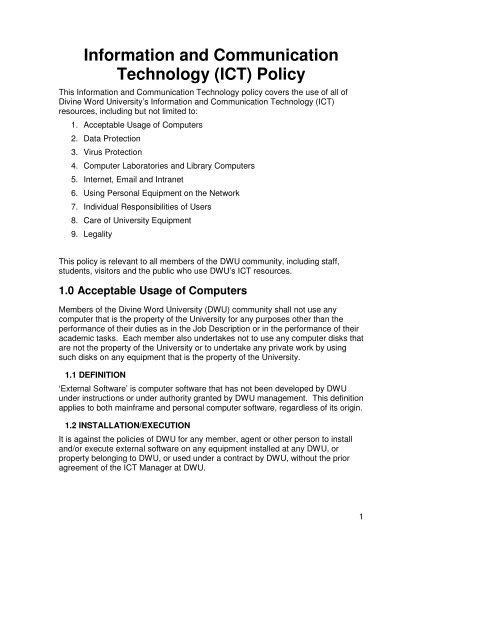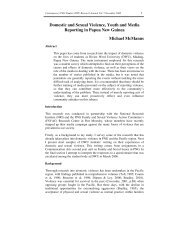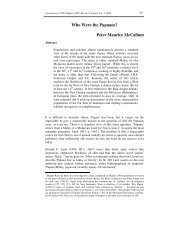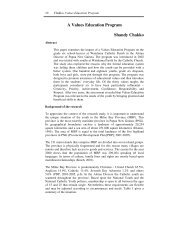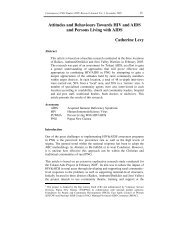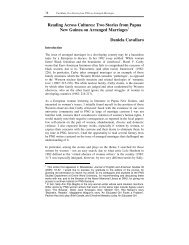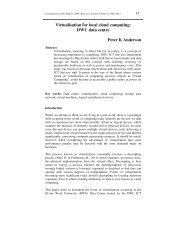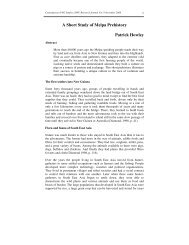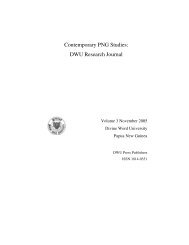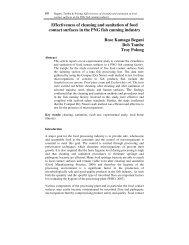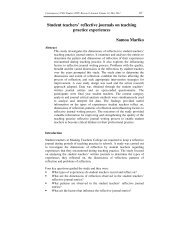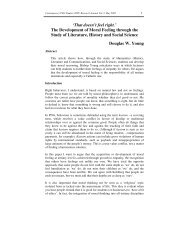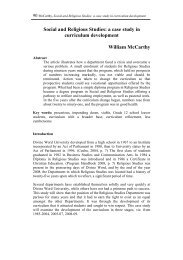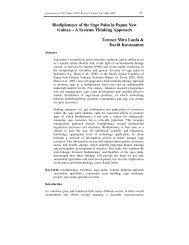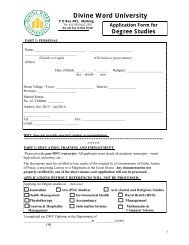Computer Use Policy - DWU Intranet - Divine Word University
Computer Use Policy - DWU Intranet - Divine Word University
Computer Use Policy - DWU Intranet - Divine Word University
Create successful ePaper yourself
Turn your PDF publications into a flip-book with our unique Google optimized e-Paper software.
Information and CommunicationTechnology (ICT) <strong>Policy</strong>This Information and Communication Technology policy covers the use of all of<strong>Divine</strong> <strong>Word</strong> <strong>University</strong>’s Information and Communication Technology (ICT)resources, including but not limited to:1. Acceptable Usage of <strong>Computer</strong>s2. Data Protection3. Virus Protection4. <strong>Computer</strong> Laboratories and Library <strong>Computer</strong>s5. Internet, Email and <strong>Intranet</strong>6. Using Personal Equipment on the Network7. Individual Responsibilities of <strong>Use</strong>rs8. Care of <strong>University</strong> Equipment9. LegalityThis policy is relevant to all members of the <strong>DWU</strong> community, including staff,students, visitors and the public who use <strong>DWU</strong>’s ICT resources.1.0 Acceptable Usage of <strong>Computer</strong>sMembers of the <strong>Divine</strong> <strong>Word</strong> <strong>University</strong> (<strong>DWU</strong>) community shall not use anycomputer that is the property of the <strong>University</strong> for any purposes other than theperformance of their duties as in the Job Description or in the performance of theiracademic tasks. Each member also undertakes not to use any computer disks thatare not the property of the <strong>University</strong> or to undertake any private work by usingsuch disks on any equipment that is the property of the <strong>University</strong>.1.1 DEFINITION‘External Software’ is computer software that has not been developed by <strong>DWU</strong>under instructions or under authority granted by <strong>DWU</strong> management. This definitionapplies to both mainframe and personal computer software, regardless of its origin.1.2 INSTALLATION/EXECUTIONIt is against the policies of <strong>DWU</strong> for any member, agent or other person to installand/or execute external software on any equipment installed at any <strong>DWU</strong>, orproperty belonging to <strong>DWU</strong>, or used under a contract by <strong>DWU</strong>, without the prioragreement of the ICT Manager at <strong>DWU</strong>.1
5. Ensuring that personal data is maintained so that it is accurate and up todate.6. Establishing that personal data is not kept for longer than necessary.7. Setting out rights for data subjects to have access to personal data heldconcerning themselves.8. Ensuring that adequate security measures are taken against unauthorizedaccess, alteration, distribution or accidental loss.It is important that all staff involved with personal data are conversant with andobserve these basic principles as part of their normal duties. Disciplinaryprocedures may be taken against any individual or individuals not observing thispolicy.2.4 INPUT OF PERSONAL DATAEach member of the <strong>University</strong> shall follow the guidelines to ensure data integrity.These include:1. Do not allow personal data to be entered into <strong>Divine</strong> <strong>Word</strong> <strong>University</strong>’scomputerised systems if you know or suspect it to be incorrect.2. Exercise care when collecting and inputting personal data if the source ornature is doubtful.3. Do not input personal data in a form that could be considered offensive bythe data subject.4. Only collect and input personal data which is relevant for the purpose.5. Ensure that personal data is not displayed on a screen for longer than isnecessary, that the terminal is not left unmanned and/or that the screen is notvisible to passing individuals.2.5 DISPOSAL OF PERSONAL DATA1. Do not leave personal data in a situation where unauthorised persons couldexamine it and/or extract information.2. Ensure you dispose of personal data in a secure manner.2.6 ACCESS TO PERSONAL DATA1. It is the policy of the university to permit easy access to personal data subject tothe need to operate in an efficient manner.2.The university does not retain any personal information, or any computerrecords which has not come directly from the person whom it describes.3.0 Virus Protection <strong>Policy</strong>3.1 DEFINITIONA PC virus is an encoded series of instructions which a computer will obey. Thereare many ways a virus can be introduced to a PC, but the main ways are via PC3
3.4 PROCEDURESCare must be taken to preserve the integrity of data and software on eachcomputer.No disk is to be left in a machine when it is powered down ‘shut down’ or ‘rebooted’and no disk is to be installed or inserted in the machine when it is booted.Special care must be taken with disks that are shared or taken off-site and used toacquire data from other machines. These disks should be proactively checked withinstalled anti-virus software before use as a data source.Machines at home must be protected by anti-virus software. Members may wish touse a commercial product and the maintenance of the licence an d updates of theproduct is the member’s responsibility: otherwise the ICT Manager should becontacted for advise about suitable anti-virus software and the ICT Manager’sadvice must be complied with in all instances.It is wise practice to regularly check your machine for virus infection. This will beincreasingly important if you rarely reboot your machine after a shut down and/oryou receive large amounts of email.4.0 USE OF COMPUTER LABORATORIES AND ACCESSTO COMPUTERS IN THE LIBRARY.4.1 All undergraduate computer laboratories are under the authority of the FacultyBoard in terms of programs installed and access of students in the laboratory. TheICT Manager is responsible for maintenance and as mentioned above no staff orstudent can install a program without the ICT Manager’s approval.4.2 Access to the Moseley Moramoro Postgraduate Research Centre. A memberof the <strong>University</strong> who wishes to have access to this laboratory has to obtainapproval from the Academic Board for their research. The Director of Researchholds the authority to give access to this lab. Students from overseas universitiesand visiting lecturers or professors may have access to this Centre. Researchstudents of the <strong>University</strong> who are engaged in higher research degrees may alsobe given access to this Centre. The level of access will be negotiated with respectto needs and availability of resources. The Director of Research will giveinstructions to the ICT Manager for this purpose.Access to the Postgraduate Centre is granted, upon request and subject to thecriteria for eligibility, to individuals. The access to researchers specifically excludesthe right of a researcher to extend access to his/her family, friends or colleagues.<strong>Use</strong> of Postgraduate Centre resources and equipment is limited solely to theresearcher for the needs of the nominated research project. Subsequent or otherresearch projects must be individually discussed with the director of Research.4.3 Access to computer facilities within the Friendship Library and Internet Café isunder the authority of the Director of Friendship Library in consultation with the ICTManager. The ICT Manager is responsible for maintenance and as mentionedabove no staff or student can install a program without the ICT Manager’s5
approval. Because the ICT Manager is responsible for the upkeep of the machinesand the Internet itself, all funds from the use of ICT resources will be directed to theICT account for the purposes of transparency and accountability.5.0 INTERNET, EMAIL AND INTRANET POLICYInternet and email polices will be described in separate sections since there aredifferent foci. However, both these sections should be read together.5.1 INTRODUCTION<strong>DWU</strong> recognises that electronic mail (email) and Internet services are importantassets to both <strong>DWU</strong> and <strong>DWU</strong> members. <strong>DWU</strong> provides all staff with email in orderto facilitate the functioning of <strong>DWU</strong> work. Internet services for staff members areexpected to increase in the future.5.2 PURPOSEThe purpose of this policy is to explain how and in what circumstances the Internetand email services can be used by staff members.5.3 POLICYEmail and Internet systems, including their contents, are considered to be theproperty of <strong>DWU</strong> and to be used for work purposes only. Messages created, sent,and received using <strong>DWU</strong>’s email system are the property of <strong>DWU</strong> and may besubject to access and disclosure by <strong>DWU</strong>. Improper use of these systems mayresult in legal claims against both the member and <strong>DWU</strong> and may result indisciplinary action up to and including termination, against the offending member.<strong>Use</strong> of <strong>DWU</strong>’s email system is permitted for personal use if it is infrequent andoccasional however, such messages become property of <strong>DWU</strong>. <strong>DWU</strong>'s email andInternet system may not be used to solicit any commercial ventures, religious orpolitical causes, outside organisations, or other non-job related solicitations. Inaddition, <strong>DWU</strong>'s email and Internet system are not to be used to create anyoffensive or disruptive messages. Offensive or disruptive messages include thosethat contain sexual connotations, racial slurs, gender-specific comments, or anyother comment that offensively addresses someone's age, gender, sexualorientation, religious or political beliefs, national origin, or disability.The email and Internet system are also not to be used to send/upload or receive ordownload any materials or information without the prior authorisation of <strong>DWU</strong>. Anymembers who discover a violation to this policy are responsible for notifying theICT Manager immediately. Any member who is in violation of this policy or uses theemail and/or Internet system improperly will be subject to discipline up to andincluding dismissal.5.4 GUIDELINES FOR USING EMAILEmail communication must be used like other business communications andcomply with any codes of conduct which already apply to the member. Emailmessages should be composed carefully to convey the intended message.6
Email uses resources on <strong>DWU</strong>’s servers and network bandwidth. This shouldalways be a consideration when using email.SecurityAll <strong>University</strong> members should be aware that email messages are not secure,consider carefully any private or sensitive information you send in an email.Content of email messagesIn the To: field include the email address/es of individuals who your messagedirectly applies to.In the CC: field include the email address/es of individuals who you would like toread the email for their information only.Addresses placed in the BCC: will not be visible to other recipients of the email.Subject line: Always include a subject line that reflects the content of the message.Chain lettersA chain letter is an email directing recipients to send out multiple copies of it, sothat its circulation increases exponentially. Messages of this kind usually promisebenefits for sending the message on to others e.g. blessings, good luck, money ormerchandise. They are hoaxes and their content should be ignored and the emailmessage deleted. People with ill intentions create chain letters to waste time andInternet resources. <strong>DWU</strong> forbids the distribution of chain letters on its emailsystem. If you are concerned about a chain letter raise it with the ICT Manager.Mass Emails (mailing lists)Sending mass emails should be limited to situations where it is necessary to informall staff of relevant information.<strong>Use</strong> of the mass email to all <strong>DWU</strong> staff is strongly discouraged. The reason to notuse ‘broadcast’ is that when an email is sent to ‘broadcast’ it is duplicated once forevery email address it is sent to. (Example: if you send an email to ‘broadcast’ itwill be sent to the email addresses of over 150 employees. If the email you sentwas one megabyte in size when you sent it, after you have sent it, it would take atotal of 150 megabytes of disk space on the email server). Mass emails should notinclude any attachments.When replying to mass emails ensure you are replying only to the sender ratherthan the entire mailing list. To reply to the original sender, you choose rather than .It is strongly recommended that all staff use the <strong>Intranet</strong> to broadcast messages forall staff. The Internet is further discussed below.5.5 GUIDELINES FOR USING INTERNETThe Internet is recognised as a tool for research and information. As such it isgrowing in importance for the rapid dissemination and acquisition of knowledge.<strong>Divine</strong> <strong>Word</strong> <strong>University</strong> is gradually making Internet resources available to itsmembers. In part, some limitations exist due to the national infrastructure of ourcountry and others exist due to high costs of provision. As resources become7
available Internet facilities will become more readily accessed. Initially, staff andstudents may use the Internet Café in the library. Staff may apply for Faculty fundsto purchase Internet Café time for their research and scholarship needs. Studentscan also purchase time at the Café. The rate of time charge is subsidised to offermembers access more economically than is commercially possible.The Internet hosts a large amount of material. Some of this material is text,pictures, sound and movie files and connections to online purchasing operations ofmany types. Not all of this material is of high quality. Because the Internet isbasically an unsupervised, free market, information is not checked for veracity norusefulness. It is a case of “user beware!” similarly, not all material on the Internet iscompatible with the values and respect for persons that <strong>DWU</strong> models and exhortsof its members. Personal use of Internet facilities, eg online shopping or onlinebanking as just two examples, are at the member’s own risk and <strong>DWU</strong> cannot beheld responsible for any transaction if it is conducted on <strong>DWU</strong> equipment.Furthermore, care must be used so that Internet use does not infringe <strong>DWU</strong>’smoral code nor bring <strong>DWU</strong> or its members into disrepute. Since using the Internetat <strong>DWU</strong> is using <strong>DWU</strong> resources, members are responsible for their properconduct in this area. The policy provisions of Section 5.3 apply equally in regard toInternet use.As an aide de memoire, the following points will be helpful as guidance towardsproper conduct:• In no way bring dishonour to the <strong>University</strong> or its members;• Not be for commercial or financial benefit of myself or others;• Be for my personal academic purposes;• Not be shared with any other person;• Not involve exploration of sites, pornographic, racial or such others, that arecontrary to the values and ethos of <strong>Divine</strong> <strong>Word</strong> <strong>University</strong>;• Be open to the inspection of the relevant persons in <strong>Divine</strong> <strong>Word</strong> <strong>University</strong>;• Comply with all academic policies of <strong>Divine</strong> <strong>Word</strong> <strong>University</strong>.5.6 GUIDELINES FOR USING INTRANETThe intranet is the local, within <strong>DWU</strong>, connection between people on the <strong>DWU</strong>network. The intranet is a bit like a private phone network, ie only call inside thecompany and the Internet is a public, ie call anyone, phone network.The intranet is the preferred and strongly advised means for staff members tocommunicate on a normal basis when the message is of general interest andrelevant to the majority of staff members. The intranet is available at the openingpage, or homepage, of the network at http://petrus/intranet/ . The intranetbroadcast is called COMMUNITY BROADCAST.The intranet is also the source for commonly referred documents pertaining to the<strong>University</strong>. <strong>Policy</strong> statements, common data types like <strong>University</strong> images,information from the <strong>University</strong> leadership, <strong>DWU</strong> community news, events and theStaff Guide and Staff Directory are all readily accessed via the intranet.8
Those wishing to add documents or an organisational section to the intranet needto contact the Software Developer in the ICT Department in the first instance.Members should forward information pertaining to the <strong>University</strong> Calendar or<strong>University</strong> events to the Event Co-ordinator in Administration. All other informationfor Community broadcast pages should be forwarded to the Software Developer.6.0 USING PERSONAL EQUIPMENT ON THE NETWORKNo equipment may be attached to the <strong>DWU</strong> network or any computer connected tothe network in such a manner to threaten the integrity or the security of thatnetwork, or to damage physically, electronically or in any other means <strong>University</strong>owed equipment, data or infrastructure.Students are not to connect any equipment other than a personal flash drive of anapproved standard to a <strong>University</strong> machine.Staff and researchers may have special needs that require particular items ofequipment that might be non-standard. These needs should be discussed in thefirst instance with the ICT Manager.Staff and researchers may wish to connect particular non-standard items to acomputer they have access rights. Provided the first provision of this sectionapplies, and the member understands that the equipment is connected at ‘theirown risk’, such connections are permitted as fair usage. Each member will beresponsible for the maintenance and security of this equipment, and the ICTdepartment and its staff will not be responsible for its service, maintenance orreplacement due to loss or malfunction.If individuals have laptops or notebook computers, they can use them as standalonecomputers at the <strong>DWU</strong>. Notebooks and laptops are NOT to be connected tothe network, or to the printer. However, if there is a compelling reason for anotebook to be connected to the network, such as the need to transfer data fromthe network drive to your notebook, or from your notebook to the printer, then theindividual must get permission from the ICT Manager. If permission is granted,then the individual will need to take the notebook to ICT Help Desk, the IT SupportOfficer will update the Antivirus virus definition and registration information andperform the reconfiguration of the notebook. Notebooks connected to the networkwill be monitored for network traffic, as are all the computers in the computer labsand ICT locations. The initial scan after this installation may well take several hoursdepending on the size of the computer’s drive and the amount of data andprograms stored on the drive.The development plans for ICT on the Madang campus include the gradualdeployment of wireless networks for home and office uses. The initial phases ofthis deployment will involve the successive:• Trial of coverage with a small pilot deployment. The details of this pilot willbe at the judgement of the ICT Manager and under their direction, subject togeographical as well as resource limitations;• The first access will include email and Internet;9
• Later deployment may increase to allow access to the network and hencepersonal and <strong>DWU</strong> files of H: drive. This later deployment will be informedby security and maintenance issues as they become known in earlierstages.7.0 INDIVIDUAL RESPONSIBILITIES OF USERSThis section addresses the vital topic of backing up personal data and files. Allcomputer equipment is subject to failure. As such, even hard drives in computershave a limited life expectancy and disk drive failure can mean the loss of criticaldata. This section details the responsibilities and tasks of wise data management.ICT take a daily backup and a weekly backup of the Administration and StudentServers for the purpose of restoring the system in case of system failure. Backupsare held for one week, after which the backup medium is recycled. In the event of aserver or hard drive failure, ICT will restore such files but cannot guaranteerestoration. It is critical that prompt request for this service be made to ensure thatthe recycling of the medium does not overwrite the required files. The responsibilityfor backing up user files remains solely with the user. If ICT Services' staff haveoccasion to deal with problems on staff desktop devices, ICT Services will not beresponsible for any loss of data on the device resulting from any action undertakenas part of support work. <strong>Use</strong>rs are obliged to have backups of all of their files priorto any troubleshooting being undertaken by ICT Services staff.Some virus infections and some machine maintenance procedures require thereformatting of the hard drive. This means that ALL data and software will beirretrievably erased. For this reason alone, a backup is essential.As a general rule, if you feel that you cannot afford to lose it, you must back it up!BackupA backup is a copy of files held on a different medium/data device stored awayform the original source. For most users this means the network and the personalfilespace allocated to each user.Each personal user is allocated 500Mb on the server, and individual departmentsare allocated 1Gb of space. These limits are enforced in the software and cannotbe exceeded. The option to use the <strong>DWU</strong> fileserver as a data backup is onlyoffered with respect to those file that directly relate to <strong>DWU</strong> roles and tasks. Thus,files that are related to personal use and personal records are not to be stored onthe network. Those files which may backed up to the fileserver include <strong>DWU</strong>related:• Documents;• Spreadsheets;• Databases• Web pages and accompanying images• pdf files10
The following personal files are not to take up space on the fileserver:• Music;• Digital images including pictures and movies;• Downloaded games, and saved game data, or other programs;• Files of a personal nature not related to <strong>DWU</strong> responsibilities.The ICT Help Desk will assist you to create a backup regime that works for you,teach you to use the backup software that comes with MS Windows and isavailable on each machine.The Friendship Library will have the facility to create backup data by writing CDROMs and DVDs. A CD ROM can hold up to 600Mb of data and this copy is areasonably permanent one – subject to correct storage and use like a music CD. ADVD can hold 4Gb of data or up to 9Gb in double density mode, and a DVD is asimilarly permanent record like a CD except it does store much more data. DVDssuitable for recording are slightly more expensive than CDs, and their advantagesfor those who have lots of data are clear. This facility in the library will be a freeone for all members, subject to each member providing their own CD or DVDmedia.8.0 CARE OF UNIVERSITY EQUIPMENTICT resources represent a significant proportion of the expenses of the <strong>DWU</strong>community, and replacement of equipment is a constant expense. Fundsexpended to replace or repair equipment damaged to lost due to neglect, improperor careless use reduces the purchase of new equipment to improve our facilitiesand increase members’ access to ICT Resources.The general rule is that as a responsible member of the <strong>DWU</strong> community you areasked to care for <strong>DWU</strong> property as though it were your own. This means that youhave an attitude of responsible use and care so that:• Equipment is only used for the purposes for which it is intended;• Signs of malfunction [strange noises, excess heat, loss of function] arereported to the ICT Department to facilitate inspection, repair orreplacement;• Should others be observed using equipment in an irresponsible way eitherthat member is reminded of their responsibility personally or the matter isreferred to a senior staff member or the ICT personnel;• Equipment is not left in a situation where theft or improper use might occur.As such, doors will be locked by the last person leaving the room, andsuspicious persons or circumstances be reported immediately;• Members will have a pro-active approach to the safety and care of<strong>University</strong> equipment as an expression of their concern for the commongood.11
9.0 LEGALITY1. If any covenant or other provision of this <strong>Policy</strong> is invalid, illegal or incapableof being in force by reason of any rule of law or public policy, all other conditionsand provisions of the <strong>Policy</strong> shall, nevertheless, remain in full force and effect, andno covenant or provision shall be deemed dependent upon any other covenant orprovision unless so expressed herein.2. This <strong>Policy</strong> is part of the formal <strong>Divine</strong> <strong>Word</strong> <strong>University</strong> procedures and notadhering to it will render a <strong>University</strong> member subject to appropriate DisciplinaryAction.3. Depending on circumstances, the action taken will range from a writtenwarning being placed on the offender’s Personnel File up to and includingSummary Dismissal.<strong>Policy</strong> approved by Cabinet Tuesday 28 th March 2006.12


